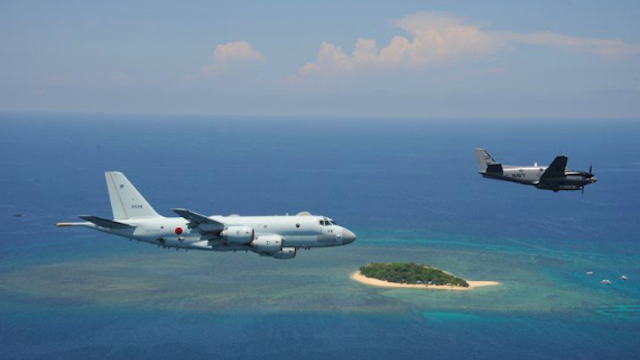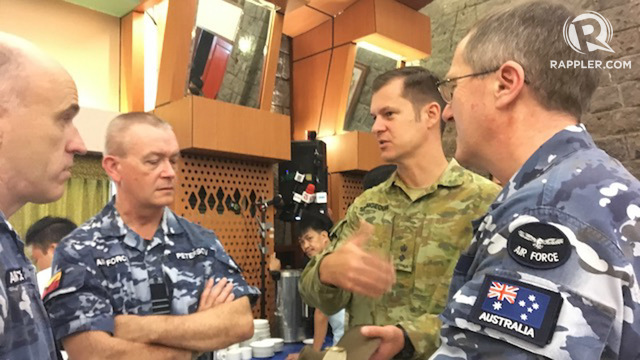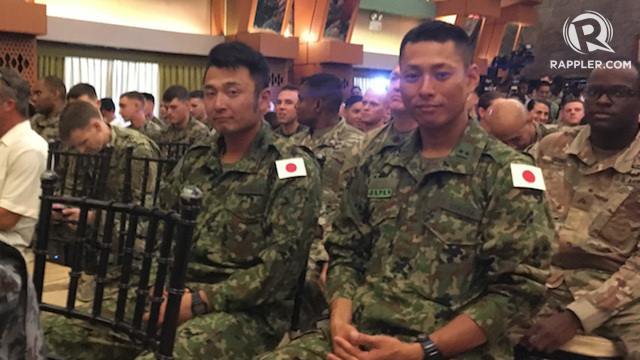'I think the Philippines has not entirely bowed down in the face of China. The political relationship clearly has been changed under President Duterte, but it’s more complicated than that,' says security analyst Euan Graham of the Australian think tank Lowy Institute

ENEMIES-TURNED-ALLIES. A P-1 patrol aircraft of the Japan Maritime Self Defense Force and a Beechcraft C-90 of the Philippine Navy fly over the West Philippine Sea for Exercise Balikatan 2018. Photo courtesy of JMSDF
Philippine defense cooperation with Australia and Japan stepped up in recent years, continuing to grow under the administration of President Rodrigo Duterte.
Euan Graham, director of the international security program of Australian think tank Lowy Institute, said these ties should be taken into account when understanding the country's relations with China.
"I think the Philippines has not entirely bowed down in the face of China. The political relationship clearly has been changed under President Duterte, but it's more complicated than that," Graham told Rappler.
Jose Antonio Custodio, military analyst and historian, said ties with Australia have focused on counter-terrorism and containment of violent extremism, while ties with Japan have focused on the South China Sea situation.
At the start of his administration, Duterte threatened to scrap defense treaties with the US in favor of closer ties with China and perhaps Russia.
But alliances among militaries – especially one as longstanding as the Philippines and the US – cannot be broken or built overnight. It takes years or decades to synchronize tactics, techniques, and procedures to achieve interoperability.
Duterte's pivot to China won't be easy for Americanized PH military
Custodio said there have been "cosmetic" but no significant changes in the country's ties with the US military. Cooperation during the siege of Marawi put this on display.
Meanwhile, Duterte is facing criticism over his friendship with China. This comes in the wake of reports that the military superpower has installed missiles on a Philippine reef it occupied in 1994 and landed a bomber on the nearby Paracel Islands, which it seized from Vietnam in 1974.
'Acceptable partners'
Euan Graham, director of the international security program of Australian think tank Lowy Institute, said these ties should be taken into account when understanding the country's relations with China.
"I think the Philippines has not entirely bowed down in the face of China. The political relationship clearly has been changed under President Duterte, but it's more complicated than that," Graham told Rappler.
Jose Antonio Custodio, military analyst and historian, said ties with Australia have focused on counter-terrorism and containment of violent extremism, while ties with Japan have focused on the South China Sea situation.
At the start of his administration, Duterte threatened to scrap defense treaties with the US in favor of closer ties with China and perhaps Russia.
But alliances among militaries – especially one as longstanding as the Philippines and the US – cannot be broken or built overnight. It takes years or decades to synchronize tactics, techniques, and procedures to achieve interoperability.
Duterte's pivot to China won't be easy for Americanized PH military
Custodio said there have been "cosmetic" but no significant changes in the country's ties with the US military. Cooperation during the siege of Marawi put this on display.
Meanwhile, Duterte is facing criticism over his friendship with China. This comes in the wake of reports that the military superpower has installed missiles on a Philippine reef it occupied in 1994 and landed a bomber on the nearby Paracel Islands, which it seized from Vietnam in 1974.
'Acceptable partners'

AUSTRALIA. The Australian Defense Force has 60 personnel participating in Exercise Balikatan 2018. Photo by Carmela Fonbuena/Rappler
Graham said Australia and Japan both appear to be "acceptable security and defense partners" to Duterte, allowing the two countries to fill the political vacuum between Manila and Washington. (READ: Duterte tours Japan's biggest warship)
Unlike China and Russia, Australia and Japan have a headway in building military-to-military ties with the Philippines.
Australia is the only country other than the US that has a visiting forces agreement with the Philippines, a treaty that came to force in 2012.
Japan, the country's biggest source of Official Development Assistance, has also shown the capability "to provide a generous materiel largesse for the military," said Custodio.
Talks for a visiting forces agreement with Japan began in the previous Aquino administration, which Custodio said, will "likely" continue to be discussed.
Meanwhile, China is trying to build ties with the Philippine military. "The best way for the AFP to make itself a laughingstock of the Filipino people is to engage in an effort to develop strong military-to-military ties with China," said Custodio. (READ: PH plans for Pag-asa to test Duterte's friendship with China)
Exercise Balikatan: Nueva Ecija and Palawan

JAPAN. The Japan Maritime Self Defense Force has 20 personnel participating in Exercise Balikatan 2018. Photo by Carmela Fonbuena/Rappler
The annual Exercise Balikatan between the Philippine and US militaries played a key role in increasing the country’s security ties with Australia and Japan.
This year, the Australian Defense Force (ADF) had a P-3 Orion surveillance aircraft and 60 personnel – most airmen – participate in the war games. The Japan Maritime Self Defense Force (JMSDF) had a P-1 patrol aircraft and 20 personnel, also mostly air men.
They are among 8,000 forces, including 3,000 Americans, participating in war games aimed at improving the interoperability of the allied militaries.
The number of Australian and Japanese troops participating in the war games was small but their activities were significant – surveillance and patrol from aircraft – and consistent with their focus areas.
From May 16-17, ADF’s P-3 Orion surveillance aircraft flew over Nueva Ecija to simulate urban fighting with its Philippine and US counterparts. Its job was to provide real time intelligence – coordinations and movements – of enemies.
"It is similar to the role performed by the aircraft during the Marawi crisis," Captain Brad White, Australian defense attache to the Philippines, told Rappler. The ADF flew two P-3 Orion aircraft to help out during the siege.
Vice Admiral David Johnston, ADF chief of joint operations, said Australia's participation in Exercise Balikatan shows its commitment to regional security and stability. It's the 5th year Australia is joining the exercise.
"Exercise Balikatan 18 is a valuable opportunity for participating nations to prepare for real world challenges," Johnston said.
Earlier, on May 8, a JMSDF P-1 patrol aircraft flew off the coast of Palawan together with Beechcraft C-90 planes that Japan leased to the Philippine Navy.
A photo showed the planes flying above an unnamed island in the West Philippine Sea. Another photo showed Japanese and Filipinos standing shoulder-to-shoulder on the tarmac of Antonio Bautista Air Base in Palawan.
(8 May) The JMSDF patrol air craft P-1 conducted goodwill exercise with Philippine Navy beachcraft C-90 in the waters and air around Palawan Island, Philippine. #jmsdf #jdf #friendship #partnership #ASEAN #P1 #PhilippineNavy pic.twitter.com/ygTKWbAWDD— 防衛省 海上自衛隊 (@JMSDF_PAO) May 9, 2018
The activity in the West Philippine Sea, where Duterte scrapped joint patrols with the US to please China, was not lost on security observers.
"They were operating off Palawan so there is maybe an increasing leeway for those kinds of exercises," said Graham.
Fighting ISIS together
Australia's visiting forces agreement with the Philippines means it can't have a base in the country but it can have a rotating troops presence.
The relationship matured significantly during the 5-month long battles. After the war, they agreed to conduct a training program on urban fighting that is exclusive between the two militaries.
While Balikatan is ongoing, another group of 70 Australian forces are preparing for a 4-week exercise to train Philippine Army troopers in urban fighting. It's similar to what the Americans provide Filipino ground troops in Balikatan.
"Each rotation is about 4 weeks long. Bunch of training is delivered then consultation with AFP. New target audience where that goes. We move where the Philippine army wants us to move to deliver that training," said White.
It is mutually beneficial. "For Australia, there is a genuine interest in preventing foreign fighters coming from the Middle East from establishing themselves closer to Australia or maybe attacking Australian citizens or interest in the region," said Graham.
On top of the exercises, the ADF is also helping the Philippines patrol the waters of southern Philippines, part of the campaign against local terrorist groups operating in the islands of Mindanao.
"We've got significant engagement with the Philippines. Since Marawi, we've actually increased our engagement," said White.
Japan relaxes weapons rule
When Japan lifted its weapons export ban, it signalled to the world its growing security role in the region. The ban was a self-imposed policy it adopted when it took a pacifist mindset after World War II.
The Philippines is the first beneficiary. Japan transfered 5 TC-90 patrol planes to the Philippine Navy to enable the country to better establish its presence in its maritime territories.
Small planes for PH Navy signal Japan's growing security role
This was the same plane the Philippine Navy flew during the Balikatan exercise in the West Philippine Sea.
The TC-90s are faster and have longer range than the Islander aircraft the Navy has been using.
https://www.rappler.com/newsbreak/in-depth/202704-euan-graham-duterte-china-philippine-military-australia-japan

No comments:
Post a Comment
Note: Only a member of this blog may post a comment.